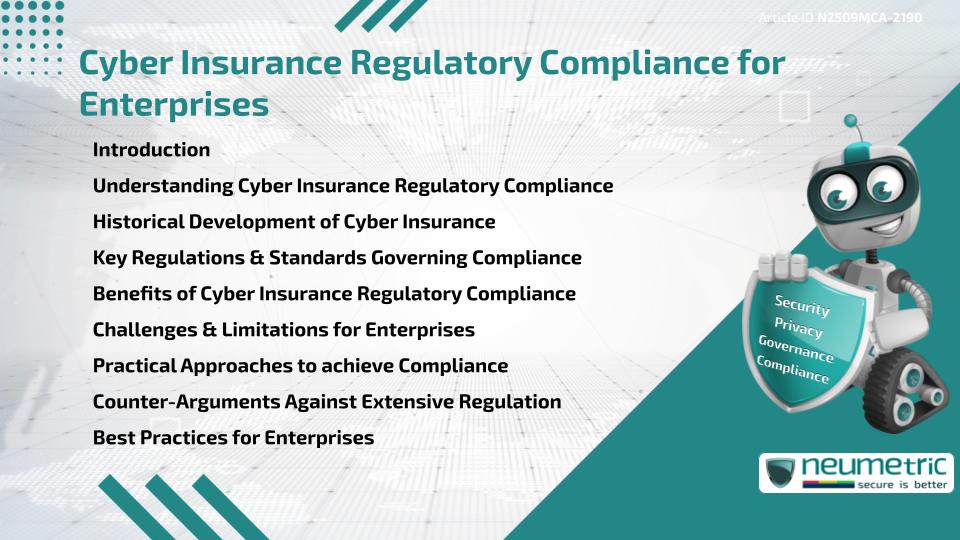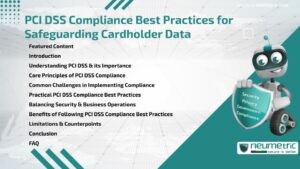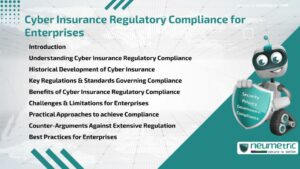Table of Contents
ToggleIntroduction
Cyber Insurance Regulatory Compliance has emerged as a vital requirement for enterprises navigating the increasing Risks of cyberattacks & data breaches. As insurers impose stricter standards & regulators mandate clearer Accountability, enterprises must ensure they meet Compliance obligations to secure coverage & avoid penalties. This article explores the meaning of Cyber Insurance Regulatory Compliance, its history, key regulations, benefits, challenges & Best Practices for enterprises.
Understanding Cyber Insurance Regulatory Compliance
Cyber Insurance Regulatory Compliance refers to the process of adhering to laws, Policies & Industry Standards that govern how enterprises qualify for, maintain & benefit from Cyber Insurance coverage. It involves proving that an organisation has adequate safeguards, Risk Management Policies & Data Protection measures in place before insurers underwrite Policies.
Simply put, it ensures that insurance does not become a substitute for Cybersecurity but instead complements it by demanding Accountability.
Historical Development of Cyber Insurance
The concept of Cyber Insurance began in the late 1990s when insurers started offering limited coverage for electronic data & network failures. With the rise of high-profile breaches in the 2000s, Cyber Insurance grew into a specialised industry.
Over time, Regulatory Bodies stepped in to define minimum standards for enterprises purchasing these Policies. For example, requirements for Incident Response Plans, Employee Training & Data Encryption became Standard preconditions for coverage. These developments shaped today’s Cyber Insurance Regulatory Compliance landscape.
Key Regulations & Standards Governing Compliance
Enterprises face a diverse range of frameworks that influence Cyber Insurance Regulatory Compliance:
- General Data Protection Regulation [GDPR] in the European Union requires enterprises to demonstrate strong Data Protection before Policies can apply to Breaches.
- Health Insurance Portability & Accountability Act [HIPAA] in the United States mandates specific safeguards for enterprises in Healthcare, affecting insurance requirements.
- New York Department of Financial Services Cybersecurity Regulation [NYDFS] sets mandatory standards for Financial Institutions, directly influencing underwriting practices.
- National Institute of Standards & Technology [NIST] Cybersecurity Framework provides guidelines that insurers often require enterprises to align with.
These regulations & standards collectively establish the conditions enterprises must meet to remain compliant & secure insurance coverage.
Benefits of Cyber Insurance Regulatory Compliance
Enterprises that comply with Cyber Insurance Regulatory frameworks gain several advantages:
- Eligibility for Coverage as insurers are more willing to underwrite Policies for compliant organisations.
- Reduced Premiums because Risk Management measures lower the Likelihood of costly Incidents.
- Improved Security Posture by adopting frameworks that reinforce Best Practices.
- Regulatory Protection by showing due diligence in case of Audits or Investigations.
In essence, Compliance serves as both a shield & a passport, enabling enterprises to access insurance while strengthening resilience.
Challenges & Limitations for Enterprises
Despite its importance, Cyber Insurance Regulatory Compliance poses challenges:
- Complex Requirements vary across industries & regions, creating uncertainty.
- High Implementation Costs for technologies like Intrusion Detection & Advanced Encryption.
- Evolving Regulatory Landscape where constant updates strain resources.
- Coverage Exclusions where insurers may deny claims if Compliance lapses are discovered.
These challenges underscore the need for enterprises to treat Compliance as an ongoing process rather than a one-time achievement.
Practical Approaches to achieve Compliance
Enterprises can adopt several strategies to achieve Cyber Insurance Regulatory Compliance effectively:
- Conduct Regular Risk Assessments to identify Gaps in Security Controls.
- Implement Clear Policies & Procedures to ensure staff understand Compliance Requirements.
- Adopt Recognised Frameworks such as the NIST Cybersecurity Framework.
- Maintain Incident Response Plans that align with insurer & regulator expectations.
- Engage in Periodic Audits to verify ongoing Compliance.
These approaches ensure that enterprises remain proactive in meeting regulatory & insurer demands.
Counter-Arguments Against Extensive Regulation
Some critics argue that excessive Regulation in Cyber Insurance creates burdens for enterprises:
- Increased Costs as Compliance investments may outweigh insurance benefits.
- Reduced Accessibility for smaller enterprises that struggle to meet complex requirements.
- Overlapping Frameworks leading to confusion & duplication of efforts.
- False Sense of Security if enterprises rely too heavily on Compliance rather than building robust defenses.
These counterpoints highlight the importance of balancing oversight with flexibility.
Best Practices for Enterprises
To succeed in Cyber Insurance Regulatory Compliance, enterprises should:
- Align with Globally Recognised Standards such as NIST & ISO/IEC 27001.
- Build Governance Structures to oversee Compliance initiatives.
- Foster a Culture of Accountability where security is viewed as a shared responsibility.
- Stay Updated on Regulatory Changes across all operating jurisdictions.
These practices position enterprises to meet Compliance demands while enhancing overall Cybersecurity.
Takeaways
- Cyber Insurance Regulatory Compliance ensures enterprises qualify for coverage while strengthening Cybersecurity.
- Historical developments shaped today’s requirements, from limited Policies in the 1990s to comprehensive frameworks today.
- Benefits include coverage eligibility, reduced premiums & improved resilience.
- Challenges such as high costs & complex rules require continuous effort.
- Best Practices & structured approaches enable enterprises to stay compliant & secure.
FAQ
What is Cyber Insurance Regulatory Compliance?
It is the process of meeting legal, regulatory & insurer requirements that govern enterprise eligibility for Cyber Insurance coverage.
Why is Cyber Insurance Regulatory Compliance important?
It ensures enterprises can obtain coverage, reduces premiums & improves security posture through mandated Best Practices.
Which regulations affect Cyber Insurance Regulatory Compliance?
Key frameworks include GDPR, HIPAA, NYDFS Cybersecurity Regulation & the NIST Cybersecurity Framework.
What challenges do enterprises face in achieving Compliance?
They face high costs, complex requirements, evolving regulations & Risks of coverage exclusions.
How can enterprises reduce Compliance costs?
They can adopt Standardised Frameworks, conduct regular Audits & integrate Compliance into existing security operations.
Do smaller enterprises need to follow Cyber Insurance Regulatory Compliance?
Yes, although they may struggle more with costs, Compliance is necessary to secure coverage & protect against Risks.
What happens if an enterprise fails to comply?
Insurers may deny claims, regulators may impose fines & reputational damage can increase Financial losses.
Need help for Security, Privacy, Governance & VAPT?
Neumetric provides organisations the necessary help to achieve their Cybersecurity, Compliance, Governance, Privacy, Certifications & Pentesting needs.
Organisations & Businesses, specifically those which provide SaaS & AI Solutions in the Fintech, BFSI & other regulated sectors, usually need a Cybersecurity Partner for meeting & maintaining the ongoing Security & Privacy needs & requirements of their Enterprise Clients & Privacy conscious Customers.
SOC 2, ISO 27001, ISO 42001, NIST, HIPAA, HECVAT, EU GDPR are some of the Frameworks that are served by Fusion – a SaaS, multimodular, multitenant, centralised, automated, Cybersecurity & Compliance Management system.
Neumetric also provides Expert Services for technical security which covers VAPT for Web Applications, APIs, iOS & Android Mobile Apps, Security Testing for AWS & other Cloud Environments & Cloud Infrastructure & other similar scopes.
Reach out to us by Email or filling out the Contact Form…





